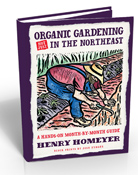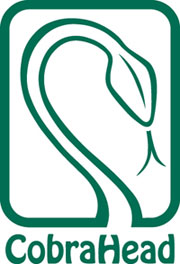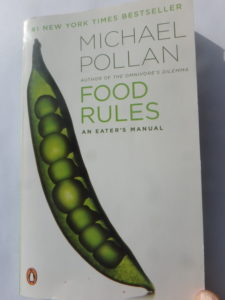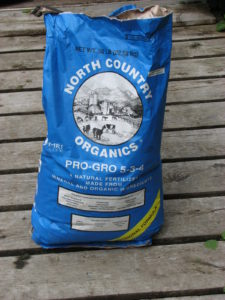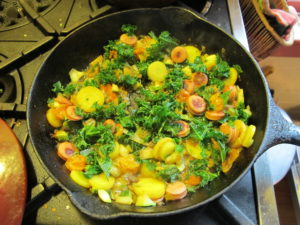To Eat Better, Eat from the Garden
As we go through the holidays, we tend to relax our vigilance about eating. Or at least I do. Like a woodchuck bulking up for hibernation, I find myself enjoying comfort foods during the long winter nights – and days. It is easy to gain a few pounds, even with the best of intentions, so I was attracted to Michael Pollan’s 2009 book, Food Rules: An Eater’s Manual. It does not attempt to prescribe a diet that will help me to lose weight after the holidays, but I know if I follow it, it will help.
I liked the book a lot, in part, because it is a quick and easy read. I read it all in 2 or 3 hours. And it is mostly common sense, but a good reminder about things I know instinctively, but may have ignored over the holidays. As a gardening guy I put up a lot of food I grow, and sometimes it languishes in the freezer, on the pantry shelves, or in my spare fridge. The book motivated me to dig out the frozen kale and use it! Eating from my own garden is always healthy.
Pollan starts by acknowledging that it is difficult to sort through mountains of conflicting advice. Should we all be avoiding fats, or is it the carbohydrates? Is gluten bad for all of us? Should we be drinking red wine for the polyphenols? What are omega-3 fatty acids, and are they worth fussing over?
His main premise is one he elaborated on in earlier book, In Defense of Food: “Eat real food. Not too much. Mostly plants”. By real food, he means food that comes from plants or animals, not factories. What is in a Twinkie? Can you imagine the products that make one coming from natural substances that you could grow yourself? I can’t.
Pollan explains that people who eat the so called “Western diet” are generally less healthy than people who eat a traditional diet, whatever that may be (Japanese, Mediterranean, even Eskimo diets are healthier than ours). The Western diet contains “lots of processed foods and meat, lots of added fat and sugar, lots of refined grains, lots of everything except vegetables.” So Pollan put together a short book of rules to follow. Many of the 64 so called rules are catchy.
For example, #7: “Avoid food products containing ingredients that a third-grader cannot pronounce”.
#13: “Eat only Foods that will eventually rot”. I’m not interested in eating anything with a long shelf life because I know it’s probably full of chemicals.
#30: “Eat well-grown food from healthy soil”. I couldn’t agree more. Chemical fertilizers aren’t necessarily bad, they are just limited. A bag of 10-10-10 contains 10 percent by weight of nitrogen, phosphorous and potassium, with 70 percent filler that is never specified (trade secrets).
Fertilizer will make plants grow, for sure. But a dose of compost contains 15 or more kinds of minerals needed by plants and by us, and lots of beneficial bacteria and fungi that evolved with green plants and support them. My tomatoes not only taste better than those that come in cellophane 4-packs, I believe they have more healthy ingredients.
#36: “Don’t eat breakfast cereals that change the color of the milk”.
#39: “Eat all the junk food you want – as long as you cook it yourself”. French fries are America’s favorite vegetable, but if we had to wash, peel, cut and fry them ourselves, we’d probably eat them about as often as we roast a turkey. I do eat a lot of potatoes because I grow them and love them. But I almost never fry them. And mine are cooked in healthy oil, and have little salt.
#63: “Cook”. If you buy frozen pizzas or even fancy frozen meals, you are allowing someone else to decide what goes on your dinner plate. They add the salt, the sugar, and the preservatives. Why is cancer so common now? My personal theory is that all those chemicals we eat affect our bodies over time.
I’m lucky: I not only have the time to cook, I love cooking. I sometimes wake up in the morning thinking about what I will cook for dinner. I think about what is in my fridge or freezer, and how I can combine it with good ingredients to make something I want to eat today, and look forward to having leftovers tomorrow.
I plan to live well and be healthy until I am in my 90’s because I grow – and eat – lots of vegetables and fruits, many that I grow myself. What I buy is mostly organic, even when it’s expensive to buy. Heart attacks, Type II diabetes and many kinds of cancers are probably linked to the foods we eat, how much we eat, and the amount of exercise we get.
Gardening is good for us. It gets us outdoors, away from a desk or a TV. We get exercise and produce healthy food. Get your kids to help to grow the veggies this year, and they will be pretty enthusiastic about raw vegetables. Ask your children to pull a few carrots, rinse them with the hose and take a bite. You’ll see a big grin, and they’ll want another bite. Same for cherry tomatoes. I even know one boy that will eat raw onions straight from the row. So make 2019 and the year of the vegetable. We could all benefit.
You may reach Henry at henry.homeyer@comcast.net or PO Box 364, Cornish Flat, NH 03746. He is the author of 4 gardening books.

